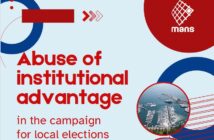Looking globally, the overall turnover in the construction industry is 3,200 billion dollars a year, which makes it very attractive for the organized crime structures. As for Montenegro, public largely fears that the money taken out of the country during the transition process is coming back and is laundered through construction of objects by the transition “winners”. That is at the same time the reason why those who dare speak about corruption in the construction industry are very rare.
During the last years, construction of residential/business objects in Montenegro has been in expansion: multi-storey buildings are mainly constructed without construction license or inspection certificate, while space and environment are illegally destroyed. In the ecological state whose main developmental strategy is tourism, illegal construction significantly reduces tourist potentials and impedes their full development. The official data are not published, but it is estimated that in the last decade around 80% of objects have been illegally built.
As a rule, market in the construction industry does not represent a regulatory mechanism that enables quality. Instead, the state must establish a strong control in order to ensure fulfillment of standards. In case of Montenegro, it is obvious that the state itself creates and encourages illegal construction through connecting objects to technical infrastructure or their legalization by means of changes and amendments of plans and selective enforcement of regulations.
Unclear and imprecise norms in the legislation and broad discretionary powers institutionalize corruption as the most efficient way of operations in the construction industry. The process of planning and developing space is basically controlled by clans that have an obvious influence on the decision-makers on the highest level. Non-transparent processes, along with the lack of public control of the work of institutions and individual responsibility create a favorable ground for strengthening of the informal centers of power and unhindered furthering of their interests, sometimes at the expense of flagrant violation of human rights.
Through a series of examples that illustrate the situation in Montenegro, this study is aimed at pointing to causes, consequences and possible forms of corruption in planning and developing space. The following topics have been dealt with: process of developing plans; issuing construction licenses and inspection certificates; construction and reconstruction of objects; selling, buying and exchange of construction land; illegal construction; organized crime and money laundering in the construction industry.
This book was presented at the 58th Annual Conference of the United Nations (UN) that precedes the General Assembly of UN . It is based on the research carried out during 2004 and 2005 within the projects funded by the United Nations Development Program (UNDP), USAI/ORT and the Balkan Trust for Democracy. Most of the research was carried out on a voluntary basis.
We hope that this study will contribute to the awareness on the significance of fighting corruption in the construction industry and be a good starting point for the authorized institutions to sanction the existing cases and prevent future ones.
Corruption in Spatial Planning and Development (PDF) download >>>



